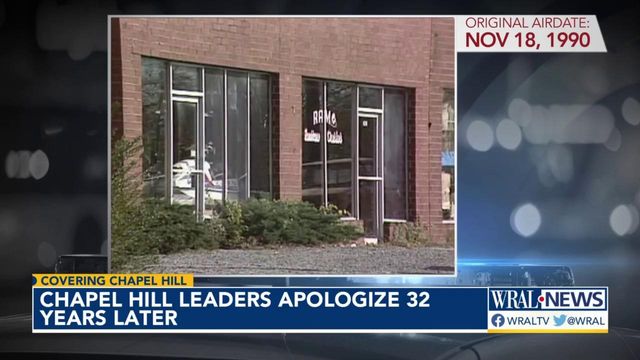'Something needed to be done': Black man illegally searched and arrested in 1990 raid reacts to town of Chapel Hill's apology 32 years later
William Barnett, Jr., 71, was among the victims of the Nov. 16, 1990, raid when dozens of Black patrons at a North Graham Street club near West Franklin Street were unlawfully searched and arrested. He was 39 years old at the time.
Posted — UpdatedThe Chapel Hill Town Council on Wednesday voted unanimously to apologize for the town’s role in a Nov. 16, 1990, raid when dozens of Black patrons at a North Graham Street club near West Franklin Street were unlawfully searched and arrested.
“This raid, known as ‘Operation Readi-Rock,’ was conducted by police officers and [State Bureau of Investigation] agents wearing camouflage and black masks,” the town’s resolution reads in part. “Police officers ordered all people on Graham Street and inside a club known as The Village Connection, to either lay face down on the floor or stand against a wall with their hands up.”
Wednesday marked 32 years since the raid.
The town’s resolution also states that many of the people searched said officers did not identify themselves while conducting the search. Some people weren’t sure whether they were being attacked or robbed, the resolution states. Also, some people were injured during the raid.
November 1990 raid
Lawyer Bill Massengale was among four attorneys representing the plaintiffs in the Graham Street civil litigation.
“This was, by far, one of the most important cases I ever dealt with,” Massengale said.
William Barnett, Jr., 71, was among the victims. He was 39 years old at the time.
“Every time I talk about it, I get just like I did that night, “Barnett said. “It was trauma. They traumatized a whole lot of people that night.”
On Nov. 10, Barnett talked about the raid in a panel discussion held at the Chapel Hill Public Library.
Massengale said the police were looking for four drug dealers who had been operating further down North Graham Street.
“The amount of force that was brought in here was unbelievable that night,” Massengale said. “They put people on the floors, they put them on the walls, looking for those four people.
“None of whom were [there]. It lasted for about an hour [or an] hour and a half.”
Barnett said he remembered how the now-defunct Village Connection used to serve as a place where people could mingle, relax, play pool, listen to music, dance, have drinks and play cards.
“All the sudden, they burst into the pool room with these assault rifles and with those laser lights on them,” Barnett said. “And all the sudden, the room was like a crystal ball with the lights all on it.”
Barnett said many of the club’s patrons didn’t know what was going on.
“We didn’t know if it was a robbery or what,” Barnett said.
Police arrested Barnett during the raid. The next day, he went back to get his photograph and fingerprints, and the police wouldn’t give them to him. That’s when Massengale got involved.
“The warrant said that there were no innocent people on Graham Street, and that there were only drug dealers and criminals,” Massengale said. “In fact, there were … 38 plaintiffs, none of whom were breaking any law.
Massengale said the town ended up paying $200,000 in a settlement among the 38 plaintiffs.
“It was peanuts for what they did,” Barnett said.
32 years later
Barnett said he tries not to think about the night of the raid. He said he’s lost a lost of sleep over it.
“Occasionally, I’ll wake up at night, you know, with a flashback,” Barnett said. “I just try to stamp it out. I wish it would go away, but it’s something that happened.”
Barnett said he believes the town’s apology fell short.
“At least put a marker or something up there, acknowledging what happened,” he said.
Barnett said the apology is an important step to acknowledge the pain and raise public awareness.
“It’s something that needed to be done,” Barnett said.
Massengale said many of the plaintiffs still live in Chapel Hill.
“In the war on drugs, this is one of the really bad moments in North Carolina,” Massengale said.
Related Topics
• Credits
Copyright 2024 by Capitol Broadcasting Company. All rights reserved. This material may not be published, broadcast, rewritten or redistributed.





